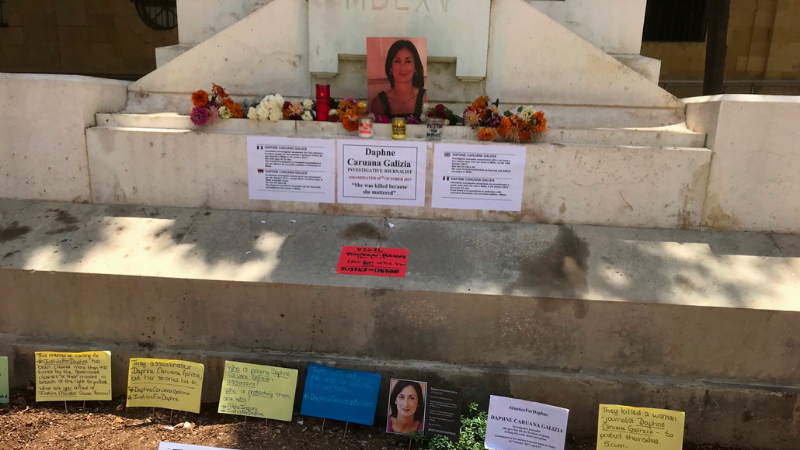The need for an independent public inquiry remained urgent, international press freedom organisation Reporters Without Borders (RSF) said as the government announced that prosecutors had filed a bill of indictment against three men suspected of planting the bomb that killed journalist Daphne Caruana Galizia.
The bill of indictment against brothers Alfred and George Degiorgio and Vince Muscat was filed on the day marking 21 months since the journalist’s assassination, as calls were again being made internationally for the investigation to identify those who ordered her killing.
RSF said all those involved in some way in the preparation and execution of the murder must be identified and prosecuted. “Twenty-one months after the assassination, those who commissioned the journalist’s death are still free,” said Pauline Ades-Mevel, RSF Head of EU and Balkans.
“We won’t forget the obstacles faced to get to the truth on this affair. The need for an independent public inquiry is more urgent than ever,” she added.
In an unusual move, the announcement of the bill of indictment filed by prosecutors was made by the Maltese government, which said in a statement the move was “further confirmation of the commitment and good functioning of the Maltese institutions”.
📝 READ: #Malta @MaltaGov notes that the three persons accused of the murder of Ms. #DaphneCaruanaGalizia have been issued with a bill of indictment. Further confirmation of the commitment and good functioning of the Maltese institutions. pic.twitter.com/UwrU9jOGjO
— Government of Malta 🇲🇹 (@MaltaGov) July 16, 2019
The Maltese government has faced a steady stream of criticism on rule of law failures in the country, with a report assessing the investigation into the journalist’s assassination and the rule of law in Malta by the Parliamentary Assembly of the Council of Europe (PACE) approved last month.
The report lists serious failings in rule of law mechanisms in the country and sets a three-month deadline for the launch of an independent public inquiry that the government has so far resisted. Dutch MP Pieter Omtzigt, who authored the PACE report, said such an inquiry would not impinge on the ongoing criminal investigation.
The bill of indictment was filed just days from the final expiration of the 20-month period – the compilation of evidence against the three men has been ongoing since December 2017. Suspects must be served with a bill of indictment within 20 months of facing charges or else be eligible for bail, according to Maltese law.
The three men will now stand trial for charges relating to building, planting, and then detonating the bomb that killed the investigative journalist on 16 October 2017. The bill of indictment lists six accusations against the three men, noting that they had been watching Caruana Galizia since at least August 2017.
This does not bring the country any closer to knowing who ordered the assassination. The failure to identify the masterminds who ordered the journalist’s assassination was noted by former President of the European Parliament Antonio Tajani in the European Parliament on Tuesday.
https://www.facebook.com/DavidCasaMEP/videos/vb.193035580892638/2743625929217480/?type=2&theater
“It’s exactly 21 months since the murder of Daphne Caruana Galizia, a journalist assassinated in Malta and we still don’t know who commissioned her death. We need to defend the rule of law everywhere, we need to defend freedom of expression,” Tajani said to applause.
On social media, the government’s announcement was met with caution. Similarities were drawn with Anna Politkovskaya’s case in Russia. The investigative journalist was shot dead in her home in 2006 and three men were arrested and charged with her murder. The case was closed following their prosecution, yet those who commissioned the hit were never brought to justice.
Last year, the European Court of Human Rights ruled that the investigation on Politkovskaya’s murder violated the European Convention on Human Rights. The Court placed emphasis on the status of the victim as an investigative journalist:
“In cases where the victim of a murder is a journalist, it is of utmost importance to check a possible connection of the crime to the journalist’s professional activity.”

Caruana Galizia was investigating corruption at the highest levels of government. She was the first to expose the fact the Minister Konrad Mizzi and the Prime Minister’s Chief of Staff Keith Schembri had secret companies in Panama set up only days after the Labour Party was elected.
Just hours after the bill of indictment was filed against the three suspects in Caruana Galizia’s case, the First Hall of the Civil Court ruled that the removal of two banners calling for justice for Caruana was in breach of the fundamental right to freedom of expression.
The banners asked:
- “Why aren’t Keith Schembri and Konrad Mizzi in prison, Police Commissioner?”,
- “Why isn’t your wife being investigated by the police, Joseph Muscat?”
- “Who paid for Daphne Caruana Galizia to be blown up after she asked these questions?”
“Our banners were a cry against the climate of impunity in Malta that ultimately enabled Daphne’s assassination,” the Caruana Galizia family said in a statement. They said they hoped the ruling would “inspire people to demand that the government respects the law and the inalienable rights of its citizens”.













